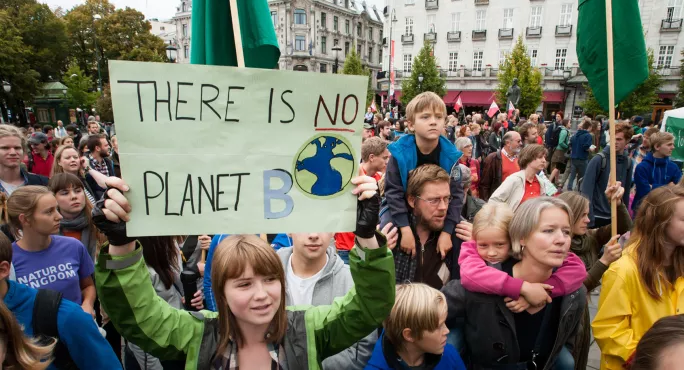- Home
- Meet the UK pupils striking against climate change
Meet the UK pupils striking against climate change

You may have heard of 16-year-old Greta Thunberg. In August 2018, she sat on the steps of the parliament building in Stockholm every day during school hours for three weeks in a silent protest. Her leaflets read: “I am doing this because you adults are shitting on my future.”
Her actions inspired thousands of pupils across the world. In November 2018, around 15,000 Australian students left their classrooms and took to the streets; on 10 January this year, 3,000 young people walked out of school in Brussels and called for action outside of the European Parliament. There’s also been strikes in Belgium, Switzerland, Germany, the US, Canada and Japan.
And now, the revolution is coming to the UK: on 15 February, thousands of British students will follow in their international peers' footsteps. In more than 30 cities and towns across the UK, young people will be missing from classrooms.
Why are they striking? What are they so passionate about? Something that affects everyone's future: climate change.
The statistics are terrifying.
According to Nasa, the planet’s average surface temperature has risen about 1.62 degrees Fahrenheit since the 19th century. What's driven this change? Put simply: we have. It's largely down to the increase in carbon dioxide and other human-made emissions in the atmosphere.
Greenland lost an average of 281 billion tonnes of ice per year between 1993 and 2016. Antarctica lost 119 billion tonnes during the same period.
The global sea level rose about eight inches in the last century. The rate in the last 20 years, however, is nearly double that of the last century and is accelerating every year.
Action is needed. And our pupils are the ones stepping up to lead it.
Fifteen-year-old George Bond has been involved in organising the UK strikes and will be at Parliament Green next Friday. Missing school isn’t a sacrifice, he says, but an investment of his time to secure not only his future but our species' future.
“We’re often told to compromise, people say it doesn’t matter to me because I’ll be dead but, in reality, we have far less time than people think and that time is running out extremely rapidly.
“People don’t know about the genuine consequences of climate change because it’s happening in so many different places they don’t see the collective damage that it’s doing. People say you have to make sacrifices to make a change, but I don’t see it as a sacrifice, I see it as an investment of my time in order to secure my future which is the most important thing, our collective future,” he says.
Seventeen-year-old Anna Taylor, one of the original organisers of the UK movement, said she never dreamed that the idea would gain so much traction.
“I was just going to spread the word as much as could. We have more than 30 cities now, but more keep popping up all the time, it’s hard to keep track of the number,” she says.
It was after attending a climate-change march in December that Anna and her friends were inspired to organise a student-led protest. They created a Facebook group, which quickly grew in popularity.
“We were talking to some people from the organisation Campaign Against Climate Change and they said why don’t you start your own school strike? I had thought about it, but didn’t know how to go about it, and didn’t think it would be possible. Talking to these people made us think why not? Let’s give it a go,” she says.
Anna is part of a core group of organisers who are meeting up every week ahead of the action. Together, they’ve come up with four demands for the government.
-
Declare a state of climate emergency in the UK and take active steps to protect the environment and make it a priority.
-
Reform the education system so that it portrays the ecological crisis in lessons and pupils learn about it more.
-
Recognise that young people have a greater stake in our future and to bring the voting age down to 16.
-
Accurately communicate to the general public the reality of the climate crisis.
Their hope is that thousands of their peers will join them in striking next Friday, which will then spark a conversation with MPs.
“Our future is at stake, and a lot of children aren’t even being taught about it accurately. I feel let down by the government at the moment. Environment reform should be a priority and it isn’t,” Anna says.
And what do their teachers think of the action? After all, it’s thousands of pupils missing a day of school – a big proportion of whom are preparing for their GCSEs and A levels.
Seventeen-year-old Beth Irving, who has been involved with organising the strike in Cardiff, said that some students she’d come across were worried about the reaction of parents, teachers and people in power.
“I think the point is that it is the children taking the initiative to say we don’t like this and we’re not afraid to break the rules to make change happen,” she says.
For Anna, striking will have consequences at school.
“My teachers support the cause and what I’m doing, but they don’t support me missing school. I’m not having massive sanctions, but they did say I’d get a detention,” she says.
“I don’t mind. The mass extinction of the earth compared to one day of school.”
Well, when put like that, it certainly seems like a matter of life and death.
Keep reading for just £1 per month
You've reached your limit of free articles this month. Subscribe for £1 per month for three months and get:
- Unlimited access to all Tes magazine content
- Exclusive subscriber-only stories
- Award-winning email newsletters



